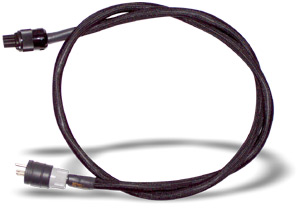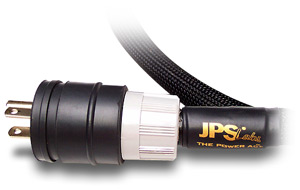![[SoundStage!]](../titles/sslogo3.gif) Home
Audio Home
Audio Equipment Review |
|||||
The original cord was "naked" in that its gray jacket was exposed. The Power AC+ is sheathed in black anti-static netting. JPS Labs continues to use high-quality AC plugs, but the one used for the Power AC+ is still very large. You cannot plug two Power AC+ cords into a single duplex AC outlet -- the plug housings push into each other's space. A Power AC+ will, however, fit in a duplex outlet with most other AC power cords that have average-size plugs. The IEC connector is a Wattgate part that grips the IEC adapter in most amplifiers tightly -- an improvement over more generic IEC connectors that can slip out easily.
Longer-term listening revealed that the Power AC adds a slight brightness to the sound. Apple Venus Vol. 1 will sound bright in systems with any tendency to brightness -- it’s right on the edge of being a bright-sounding recording without quite going there on its own. Tenor vocals were slightly less strained-sounding with the Power AC+, as if the vocalists were a little more relaxed. The London Session Orchestra seemed larger and more spread out than with the original Power AC. Instruments had more separation and were more identifiable by type of instrument and the number being played at any given time with the Power AC+. The ethereal character of "Knights in Shining Kharma" was more obvious and enveloping than the more closed-in sound produced by the original Power AC. The plaintive character of "I Can’t Own Her" seemed subtle, even ordinary with the original cord, while the Power AC+ made the tune and story compelling again, in spite of having heard it many times over the years. "The Last Balloon" has a bell in several places that seems thin and distant with the original Power AC. With the Power AC+, I was surprised that the bell has a clearer, richer tone, yet it retained its off-in-the-distance location within the soundstage. The acoustic banjo, mandolin, and guitar on the Cache Valley Drifters’ White Room [GMH CD-8011, 1996] sound more natural in the upper midrange with the Power AC+. The original Power AC sounded just a bit sharper or edgier, while the Power AC+ seemed more relaxed and composed at all times. The bass on this particular recording benefited from the original Power AC’s fuller upper bass and sounded a little thin with the Power AC+. This recording may well be a little lightweight in the upper bass; if so, the Power AC+ is producing a more accurate rendition, even if it doesn’t sound quite as rich as you might wish. The Power AC+ made all the songs sound "bigger" in every dimension. There was more of a sense of being in the presence of musicians in performance with the Power AC+. Sergio Mendes’ brilliant Brasiliero [Electra 961315-2, 1991] is a full-range, reference-caliber CD if ever there was one. The original Power AC did a fine job on this recording, but the Power AC+ revealed improvements I hadn’t thought possible. The original Power AC was consistently a little rich in the upper bass, had slightly emphasized sibilants in female vocals, and had a soundstage size that seemed smaller than that of the Power AC+. Linearity throughout the bass was excellent. The deepest octave was powerful and tight without being over-damped -- a trait of the original cord, but improved by a small increment in the Power AC+. Female vocals were about as natural as they get. This CD pretty much sealed the deal for me on the benefits of the Power AC+. I used Brasiliero several times as I switched back and forth between original and Power AC+ power cords to be certain I wasn’t hearing things that weren't there. The Power AC+ always delivered whatever this great recording could offer. Compared to the similarly priced Audio Prism SuperNatural 9.5 power cord, the Power AC+ is noticeably more dynamic and driving, with a sparkle that is missing from the SuperNatural. The Power AC+ is clearly more extended and powerful on the bottom. On the other hand, the SuperNatural’s sound is easy in its presentation -- a relaxed and pleasant sound that does its best to make music enjoyable at all times, even if the recording is less than ideal. The Power AC+ is more revealing of everything the producer and engineer did, even if their choices were not the best. The SuperNatural will glide you past the edginess and roughness in some recordings without doing obvious damage to the best recordings available. Each power cord will have its fans, but it’s difficult for me to give up the Power AC+’s dynamics, huge soundstage, bass linearity and torque. The JPS Labs Power AC+ is a worthy successor to the Power AC and deserves to carry on as a Reviewers’ Choice product. It has eclipsed all of my favorite power cords costing up to $500, when used with power amplifiers and power conditioners. I still like the audience Au24 power cord for digital components and preamps, but the Power AC+ is unbeatable in its price range when you need to deliver big-time power to your components. ...Doug Blackburn
|
|||||
|
|||||
![[SoundStage!]](../titles/sslogo3.gif) All
Contents All
ContentsCopyright © 2003 SoundStage! All Rights Reserved |


 The
The